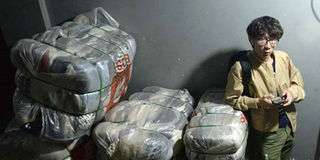Premium
Ruto promises to deport Chinese in retail trade

One of the Chinese traders who was selling bales of clothes at Gikomba market in Nairobi in 2019.
Deputy President William Ruto will deport Chinese nationals engaging in businesses that can be done by Kenyans should he form the next government, he said Tuesday.
Speaking during the Kenya Kwanza Alliance Nairobi Economic Forum at Ngong Racecourse, Dr Ruto, the United Democratic Alliance (UDA) presidential candidate, argued that there is no way Chinese will engage in retail business, roasting maize, kiosk business and other small businesses, yet Kenyans are struggling with unemployment.
“Let that not worry you. Those are Kenyan businesses and those engaged in such business, we have enough aeroplanes to deport them back to where they came from,” said Dr Ruto.
“We have agreements with different countries on what level of business or work is to be done by locals and which one is allowed, where one must have work permit, to foreigners. And that level is not selling in kiosks, retail or roasting maize,” he said.
The DP’s statement followed concerns raised by Mr Nelson Iruku, an electronics trader in Nyamakima, that the Chinese are taking over local businesses in Nairobi.
Mr Iruku complained that the Chinese sell traders goods and then after the traders have created a market for the goods, the Chinese come to Kenya to engage in the same business, selling cheaply and driving the locals out of business.
“They send their children here to take over the market from us yet we cannot be allowed to do the same in China. If there is a law that can outlaw the Chinese to stop engaging in the same business which I can do, then that will help us. We don’t have a problem with other nationals,” said the trader.
Nairobi Senator Johnson Sakaja also complained that the Chinese had invaded Nairobi and were now hawking clothes in Gikomba, selling electronics, roasting maize and have warehouses.
Hawking second-hand clothes
In 2019, pictures of a Chinese man roasting maize on a Nairobi street went viral. It has also been reported that the Chinese are also hawking second-hand clothes in Nairobi.
“Within our laws, a foreigner cannot be given work permit to engage in business that locals can do … that is under the national government and I ask that you help us because it is our traders who are hurting,” said Mr Sakaja, the UDA Nairobi gubernatorial candidate.
Also read: Why ‘Kibakinomics’ worked
In May 2019, Interior Cabinet Secretary Fred Matiang’i ordered a review of the work permits of foreigners who had applied to conduct various businesses but ended up investing in the betting industry.
Cooperation between Kenya and China has grown in recent years, especially during President Uhuru Kenyatta’s presidency, with Kenya’s exports to China growing to $227 million in 2021.
China is also one of the biggest lenders to Kenya and is currently engaged in several infrastructural projects such as the SGR, Nairobi Expressway, bypasses, Konza City and smart city facilities, industrial parks, among others.
During the economic forum that will culminate in the signing of the Nairobi Economic Charter, traders raised issues around waste management, water problems, harassment by county askaris, and lack of an enabling business environment, among others.
In response, DP Ruto and Mr Sakaja pledged to structure garbage collection in Nairobi, set up a power plant at Dandora Dumpsite to produce electricity, as well as declare the 16-acre Gikomba market public land and establish a fire station to deal with perennial fires at the market.
On the lack of access to credit, markets, multiple licences by City Hall, lack of site of operation by Jua Kali workers and mechanics, and lack of capital, the DP said his government will build 20 modern markets, set aside a Sh50 million special fund where traders will get credit at only 5 percent interest, a new single licence and do away with punitive regulations.
He also said his government would scale up the Jua Kali sector to become Kenya’s manufacturing units, with focus on metal work, leather and textile industries, while also prioritising recognition of prior learning to have artisans get papers or certificate.
“Traders in Nairobi will have one consolidated licence. We will also have business owners pay for fire licence while also talk with other counties to have business owners to pay a single inter-county licence,” said Mr Sakaja.





